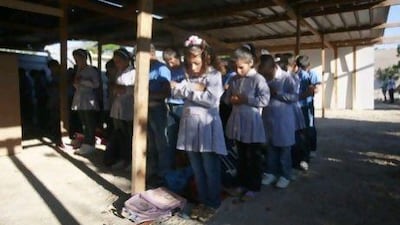KHAN AL AHMAR, West Bank // Dozens of children returned to school this week, taking part in an annual ritual that has taken on a special meaning in this Bedouin tent camp.
The makeshift school buildings, cobbled together from mud and old tyres, were built over the objections of the Israeli authorities, who are now threatening to demolish the structures. Israel says it will not tear them down until alternative facilities are available.
"We'll go to school until it's demolished," said 10-year-old Islam Hussein as she dashed to the school on a nearby hill, after hastily dressing in clothes her mother gave her. She was faster than her brother, Mohammed, 6. Their mother, Sara, playfully threw shoes at them as she told them not to be late.
Behind them was their home: a series of huts made of tin, plastic and wood forming a kitchen, sleeping room and animal pens. Nearby was the family's camel herd.
Bedouins have lived in similar conditions for centuries, sometimes preferring a nomadic lifestyle to the offer of government-built towns.
About 150,000 Palestinians - 6 per cent of the total number in the West Bank - live in the 60 per cent of the territory that remains under full Israeli control, including those of Khan Al Ahmar. This territory is also home to Jewish settlements where 300,000 Israelis live.
Palestinians and their supporters say Israel is trying to force them out by refusing to allow them to build infrastructure. Israel has issued demolition orders against about 3,000 structures, including homes, cisterns, solar-power generators and 18 schools, including the Khan Al Ahmar mixed elementary school, according to UN figures.
But only a fraction have been carried out. In the first half of this year, Israel destroyed 360 structures, the UN reported.
Guy Inbar, an Israeli military spokesman, said that while there was a demolition order for the school and the entire encampment, there was no intention to destroy it until an alternative was found for the students. Many of the community had willingly relocated to a nearby Palestinian town, he added.
Just as Israelis have built West Bank settlements over the years to cement their hold on the territory, Palestinians see building up their communities as the way to keep their land. They claim the West Bank as part of their future state.
"We are fully intent on building facts on the ground that are consistent with the inevitability of the emergence of the fully independent sovereign state of Palestine," said the Palestinian prime minister, Salam Fayyad, during a visit to the school.
The Jahalin Bedouin clan used to send their children to schools in the Palestinian town of Jericho, about 20 kilometres away. But the school bus supplied by the Palestinian Authority did not always turn up, said Eid Sweilam, a community activist.
The community decided to build its own school, completing it in 2009 with help from Western aid groups and Israeli volunteers, said Mr Sweilam.
The Palestinian Authority provided 11 teachers and other staff for the school's 90 children, ranging from grade one to seven.
Mariam Abu Ghaziah, one of the teachers, said they hoped to add further grades.
Despite the shortcomings, the school is the best education that most children will receive in this deeply conservative community. Most parents are reluctant to send their children, especially girls, outside the village to high school.
It is not proper for them to be outside for so long, said one mother, Sara Hussein, 35.
As a result, Ms Hussein, who cannot read, made her eldest daughter, Nour, 14, drop out of school after sixth grade. If the local school added later grades, she could return, but she won't be allowed to go to Jericho, her mother said.
With a stony face, Nour watched her siblings excitedly prepare for school as she shook a milk-filled goat skin - an ancient method for making butter.
"I was really good at school," she said. "I'd like to go back."

